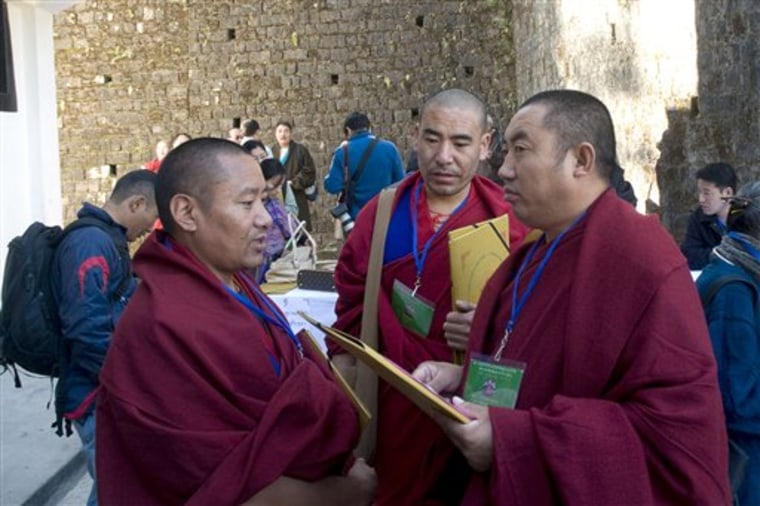Chinese leaders on Tuesday warned Tibetan exiles considering whether to push for Tibet's independence that any bid to separate the Himalayan region from China was "doomed."
The government's comments came as more than 500 Tibetan exile leaders in India held all-day private talks in their first major re-evaluation of their strategy toward China in two decades.
The Dalai Lama, the exiled Tibetan spiritual leader, has long advocated a "middle way" — seeking autonomy for the territory without independence — but he has grown frustrated in recent days over fruitless talks with China.
Tenuous relations
Deviating from that policy would almost certainly scuttle already tenuous relations with Beijing, which has long accused the Dalai Lama of fomenting an independence movement in Tibet.
"Any attempt to separate Tibet from Chinese territory will be doomed," China's Foreign Ministry spokesman, Qin Gang, told reporters. "The so-called Tibet government-in-exile is not recognized by any government in the world."
The Dalai Lama called the weeklong meeting in the northern India hill town of Dharmsala, the base of Tibet's self-proclaimed government-in-exile, so Tibetan exiles could reevaluate his Nobel Peace prize-winning "middle way." He was not expected to attend, having said he did not want to tilt the debate.
"This meeting is not about taking Tibet away from China," Thupten Samphel, spokesman for the Tibetan government-in-exile, said in response to Qin's comments. "It's about restoring the human rights of Tibetan people living in Tibet."
China dismisses meetings
China has dismissed the meeting as meaningless, contending the participants do not represent the views of most Tibetans.
The meeting follows a March uprising by ethnic Tibetans across western China that Beijing aggressively put down. The violent protests, including some led by monks, were the biggest challenge to Chinese rule in Tibet in nearly two decades.
China said at least 22 people died in the unrest, though Tibetan supporters contend many more were killed during the protests and subsequent military crackdown.
China's harsh response drew worldwide criticism, and several world leaders even threatened to boycott the Beijing Olympics in August.
Bowing to international pressure, Beijing agreed to hold talks with the Dalai Lama's representatives. But China has continued to vilify the exiled leader, repeatedly accusing him and his followers of instigating the uprising.
Much of the debate at the exile meeting in India is expected to focus on two main choices: whether to continue pursuing compromise or to begin a long-shot independence movement — a move almost certain to end talks held intermittently with Beijing since 2002.
Some factions are urging more protests, angrier protests, or more pressure on Western nations. One very small group is pushing for sabotage of China's infrastructure.
Talks are 'emotionally charged'
Samdhong Rinpoche, the exile prime minister, did not give details of what was discussed at the meetings Tuesday, but described the talks as "emotionally charged."
"There are mixed feelings — frustration, hope and determination to do something but not very clear what to do," he said.
He said the exile parliament will have the final say over any decision made this week.
China insists Tibet has been part of its territory for 700 years. Many Tibetans say they were effectively independent for most of that time. Chinese troops invaded shortly after the 1949 communist revolution, and the Dalai Lama fled to India in 1959 amid a failed uprising.
Large numbers of Tibetans remain fervently Buddhist and loyal to the Dalai Lama. If the exiles choose a more confrontational approach, Tibetans living under Chinese rule would bear the brunt of any government response.
A strong anti-Beijing sentiment could play into China's hands.
"It seems to be a possible Chinese strategy to make the radical section much stronger," said Robbie Barnett, an expert on Tibet at Columbia University. "It would mean no contacts with China and make contacts with the international community very difficult."
